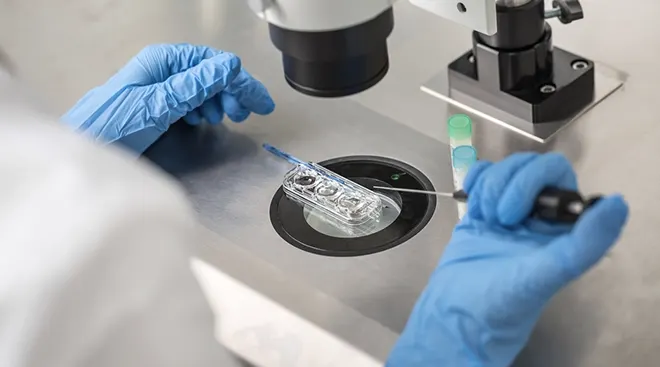What to Know About Your First Period After Miscarriage
If you’ve recently experienced a miscarriage, you’re probably processing tough emotions and have lots of complicated questions. One of the most common things you might wonder about after going through this is when your period will come again. Perhaps you’re eager to start trying again. Or maybe you need time to heal, physically and emotionally, and you’re awaiting that first period so you can start tracking your cycles again. No matter what your reason, it’s completely normal to think about this—especially since some women report changes in their cycle.
“I have a ‘new period’ post-miscarriage. Definitely had a lot of clots the first one or two times. I’ve also never had pre-period spotting. I do now! Just give yourself some time to let your body get back to normal,” says The Bump community member PurpleK26.
Here, experts explain what you need to know about your first period after miscarriage, and answer common questions you may have after going through this difficult experience.
- Most people will get their first period after miscarriage within four to eight weeks.
- Your period typically won’t be too different, but some women do report changes such as heavier or lighter periods.
- If you have heavy bleeding or don’t get your period within eight weeks after miscarriage, see your healthcare provider.
No matter how far along you are in your pregnancy, a miscarriage is always accompanied by some amount of bleeding. This is your body’s way of expelling any tissue or other materials associated with the pregnancy. Bleeding from a miscarriage varies depending on how far along the pregnancy is when the miscarriage occurs, says Martha Noel, MD, a reproductive endocrinologist and fertility specialist with Reproductive Medicine Associates (RMA) in San Francisco.
For some people, the amount and timing of bleeding with a miscarriage is so similar to a regular period that the two can be mistaken for one another. This is often the case with extremely early miscarriages or chemical pregnancies. (A chemical pregnancy is one where the fertilized egg fails to implant properly and is miscarried in week four—around the time of your expected period.)
When it comes to bleeding during a miscarriage, you may notice bleeding that starts slowly and picks up in intensity, peaking with heavy flow and often passage of clots and sometimes tissue, says Noel. “This is associated with strong cramping as the pregnancy passes out of the uterus. Once the pregnancy has passed, the bleeding will slow quickly,” she says, though you may experience a few days of light bleeding or spotting after you’ve had a miscarriage.
Most people will get their period within four to eight weeks after a miscarriage, Noel says. “It depends how quickly your body clears the pregnancy hormone hCG.” But there are other factors that could come into play as well, says Christopher M. Simons, DO, an ob-gyn with Atlantic Health System in Hackettstown, New Jersey. “A lot depends on how far along you were at the time of miscarriage, and secondarily, what your menstrual cycle was like prior to conception.” But in general, things should return to “normal” (whatever that looks like for you) once the bleeding has stopped.
When it comes to that first period after a miscarriage, it’s normal to feel a bit of trepidation. After all, you’ve just been through a traumatic experience with lots of cramping and bleeding. But if your miscarriage was complete and everything has been progressing normally since then, there shouldn’t be much to fear when it comes to getting your period after miscarriage.
In general, Noel says, “The first period after a miscarriage can vary, but it typically won’t be any more painful or heavy than a typical period no matter how far along you were at the time the miscarriage occurred. However, the earlier the miscarriage occurs, the sooner the first period will come.”
Despite this, a slight variation isn’t outside the realm of possibility, says Simons. “Periods can be very subjective from person to person, but I’ve had patients report a change in their monthly cycle following a pregnancy episode. Some have slightly heavier periods, while others experience shorter and lighter periods. The important thing is knowing your body and when to contact a health professional.”
I used to have some cramping prior to my period starting, and spotting for a couple of hours before it fully started. This time, I had spotting for three full days before my period started, and a lot of cramps. It was also way heavier than usual. I mean, I felt like a pre-teen, just starting to have periods.
Although your first menstrual period after a miscarriage might be a little different, it’s typically not anything to be concerned about. There are, however, some things to look out for that could signal a potential issue. Below, our experts share a few cases where a call to your doctor could be in order.
- Heavy bleeding. If you’re soaking through a pad completely within an hour or so, this is defined as heavy bleeding that could be a concern. According to Noel, this could mean some of the tissue from the miscarriage hasn’t yet passed completely.
- No period by eight weeks post-miscarriage. This could potentially mean you’ve become pregnant again since the miscarriage. While not an emergency situation, it’s crucial to get the right prenatal care for this new pregnancy, Noel says.
- Shortness of breath, dizziness or low urine output. These are signs of anemia and should be checked out by a doctor.
Sometimes, it’s not just the physical side effects of a miscarriage people need to be concerned about, but the mental effects as well. “Often people don’t talk about having had a miscarriage, so they feel isolated and alone, not realizing how common it is. About 20 to 25 percent of people will have one at some point in their reproductive lives,” Noel says.
You may experience feelings of sadness, depression, anger or hopelessness after a miscarriage, and all of these are normal and even expected. But, says Noel, “There are support groups available online, and often in person, depending on where you live—reach out to your ob-gyn, who should have resources available to provide to you.”
Frequently Asked Questions
When do you ovulate after miscarriage?
Ovulation after miscarriage should occur within a few weeks after the bleeding stops. According to Simons, “There’s data that shows some people can ovulate as soon as 14 days after giving birth or miscarrying, however, each person is different.” Since that first cycle can be a bit irregular, it’s a good idea to hold off tracking ovulation after a miscarriage (and use a backup form of birth control) until after your cycle has regulated, he says.
When can you start trying to conceive after miscarriage?
If your pregnancy loss occurred in the first trimester, most ob-gyns recommend waiting two or three cycles before trying again, particularly if you’re 35 or older. Just remember, you may ovulate before your period returns after a miscarriage, so it’s possible to get pregnant pretty quickly. If you don’t want to get pregnant again, you should use a form of birth control any time you have sex after a miscarriage. If you experience a miscarriage in the second or third trimester, which is much less common, check with your ob-gyn to discuss how long to wait before trying again.
How to calculate pregnancy after miscarriage without a period?
If you find out you’re pregnant after a recent miscarriage but before you’ve started having regular periods, it’ll be a bit more difficult to determine exactly how far along you are. Your doctor will likely recommend an ultrasound to take a look at the size of the fetus to get an accurate idea of your due date.
Having a miscarriage is extremely tough. If there’s any good news in a difficult situation like this, it’s that your period should resume pretty quickly after the miscarriage is over, and your cycle should regulate within a month or so. During this time, you might choose to try to get pregnant again, or you may find you need more time to heal. In any case, your period after miscarriage should eventually be similar to your menstrual cycle before you got pregnant.
Please note: The Bump and the materials and information it contains are not intended to, and do not constitute, medical or other health advice or diagnosis and should not be used as such. You should always consult with a qualified physician or health professional about your specific circumstances.
Plus, more from The Bump:
Martha Noel, MD, is a reproductive endocrinologist and fertility specialist with Reproductive Medicine Associates (RMA) in San Francisco. She earned her medical degree from Weill Cornell Medical College in New York City.
Christopher M. Simons, DO, is an ob-gyn with Atlantic Health System in Hackettstown, New Jersey. He earned his medical degree from the University of Pikeville - Kentucky College of Osteopathic Medicine.
Learn how we ensure the accuracy of our content through our editorial and medical review process.
Navigate forward to interact with the calendar and select a date. Press the question mark key to get the keyboard shortcuts for changing dates.



















































